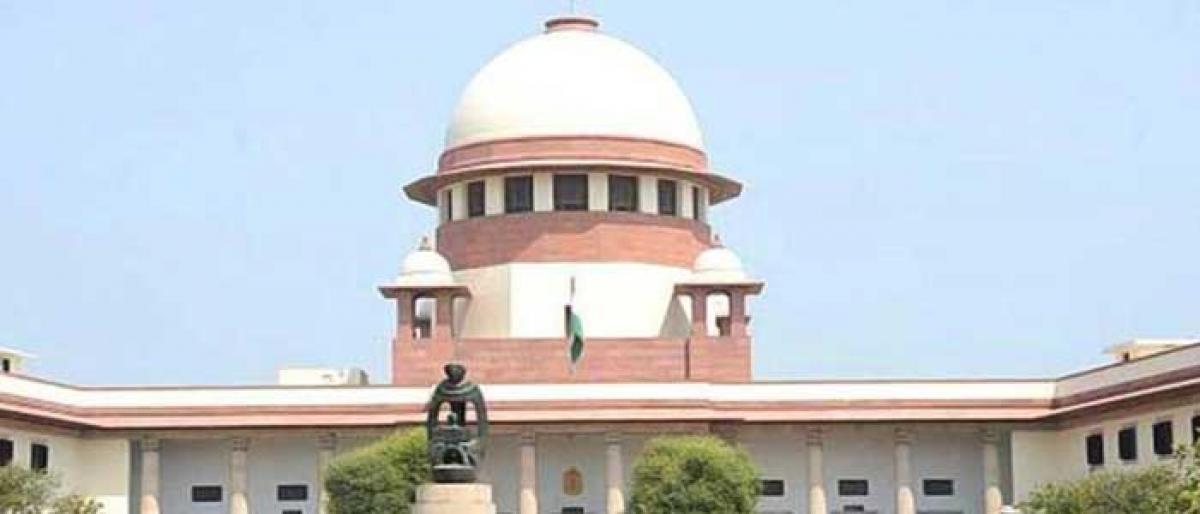Live
- PM Modi receives ceremonial welcome in Abuja, begins bilateral talks with Nigerian President Tinubu
- Goods traffic doubles on the new railway freight corridors
- BGT 2024-25: I’d like to see him make one more Test ton in Australia, says Johnso
- Harassment due to ED raids forced Kailash Gehlot to quit, hints Kejriwal
- Kailash Gehlot exit: BJP goes on the offensive against 'corrupt' AAP govt
- PM Modi pays homage to ‘the great’ Balasaheb Thackeray on his death anniversary
- One who cares for Delhi will not stay with gang of robbers: Sachdeva on Gahlot's resignation
- From Self-Doubt to Self-Love: Vange Cain’s Inspirational Path
- Rahul Gandhi remembers Balasaheb Thackeray on his death anniversary
- Tomato prices drop 22.5 pc as flow of fresh crop picks up pace
Just In

Supreme Court on Thursday unanimously ruled that individual privacy is a fundamental right, a verdict that will impact everything from the way companies handle personal data to the roll-out of the world’s largest biometric ID card programme.
New Delhi/ Mumbai: Supreme Court on Thursday unanimously ruled that individual privacy is a fundamental right, a verdict that will impact everything from the way companies handle personal data to the roll-out of the world’s largest biometric ID card programme.
A nine-member bench of the apex court announced the ruling in a major setback for the Narendra Modi-led government, which argued that privacy was not a fundamental right protected by the constitution.
"This is a blow to the government because the government had argued that people don't have a right to privacy," said Prashant Bhushan, a senior lawyer involved in the case.
However, the Centre welcomed the ruling holding privacy as a fundamental right, saying the top court has only "affirmed" the government's position on this issue. Union Law Minister Ravi Shankar Prasad told reporters that the court has said that right to privacy is not absolute and is subject to reasonable restrictions.
Rejecting the government's contention that privacy was not a fundamental right, the bench headed by Chief Justice J S Khehar unanimously overturned two earlier rulings in the M P Sharma and Kharak Singh cases that held that the right to privacy was not protected by the Constitution.
"The right to privacy is protected as an intrinsic part of the right to life and personal liberty under Article 21 and as a part of the freedoms guaranteed by Part III of the Constitution.
Decisions subsequent to Kharak Singh which enunciated the above (line) lay down the correct position in law," the bench said.
There were six judgements written by the nine judges but all of them held that right to privacy was a fundamental right.
The other judges in the bench were J Chelameswar, SA Bobde, RK Agrawal, Rohinton F Nariman, AM Sapre, DY Chandrachud, Sanjay Kishan Kaul and S Abdul Nazeer. They were ruling on a reference by the court hearing petitions filed by retired Karnataka High Court judge KS Puttaswamy and others against the validity of the Aadhaar scheme on the ground that it violated the right to privacy.
In his ruling, Justice SK Kaul said: "Let the right of privacy, an inherent right, be unequivocally a fundamental right embedded in part III of the Constitution but subject to the restrictions specified, relatable to that part. This is the call of today. The
old order changeth yielding place to new."
The judgment also has a bearing on broader civil rights, as well as a law criminalising homosexuality. Lawyers said it also impacts a ban imposed on the consumption of beef in many states and on alcohol in some states.
The ruling is the second landmark decision to come from the Supreme Court this week. On Tuesday, the top court ruled that a law allowing Muslim men to divorce their wives instantly by uttering the word "talaq" three times was unconstitutional, in a major victory for Muslim women who spent decades arguing it violated their right to equality.
The privacy judgment was delivered at the end of the tenure of the Chief Justice of India, Jagdeep Singh Khehar, who retires in a few days.
The ruling comes against the backdrop of a large multi-party case against the mandatory use Aadhaar card as an infringement of privacy. There have also been concerns over data breaches.
Critics say the ID card links enough data to create a full profile of a person's spending habits, their friends, property they own and a trove of other information.
Aadhaar, which over one billion populace has already signed up for, was set up to be a secure form of digital identification for citizens, one that they could use for government services. But as it was rolled out, concerns arose about privacy, data security and recourse for citizens in the face of data leaks and other issues.
Over time, Aadhaar has been made mandatory for the filing of tax returns and operating bank accounts. Companies have also pushed to gain access to Aadhaar details of customers.
Those opposed to the growing demand for Aadhaar data cheered the ruling. "Truly a victorious week for India - upholding liberty, dignity and freedom for all," Jyotiraditya Scindia, Congress MP, said in a tweet.
Bhushan, the senior lawyer involved in the case, said while government demands for the use of Aadhaar for tax purposes could be considered reasonable, any demands for the use of Aadhaar for travel bookings and other purchases could now be questioned in the face of the ruling.

© 2024 Hyderabad Media House Limited/The Hans India. All rights reserved. Powered by hocalwire.com







